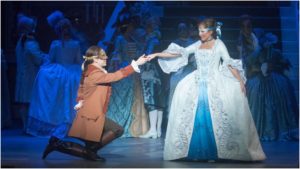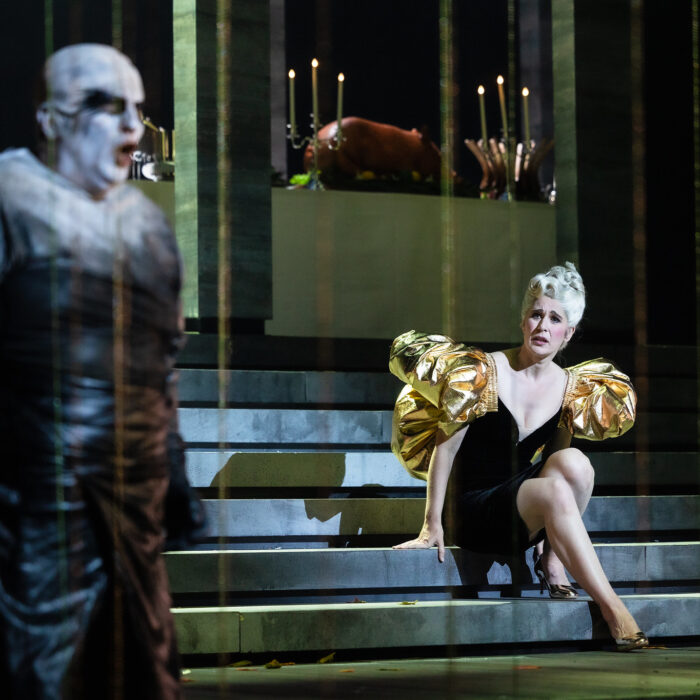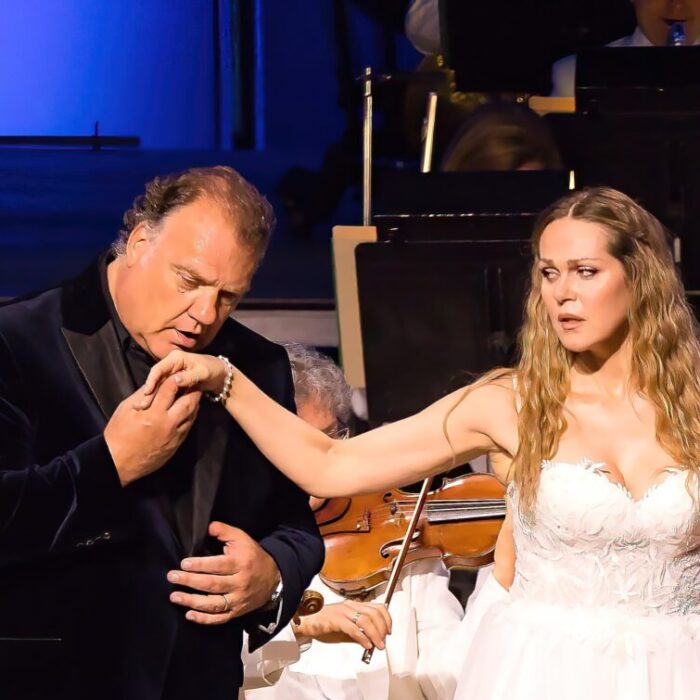
Opera San Jose 2017-18 Review – Cinderella: 12-Year-Old Alma Deutscher Is a Genius To Behold
By Lois SilversteinOn a cold-for-northern California day, two days before Christmas, people streamed into the California Theater to attend the final performance of – “Cinderella” on Market Street in San Jose (a.k.a. Silicon Valley). Not “Cenerentola,” Rossini’s comic piece, but a work by a 12-year old composer, unveiling the debut for her second opera. Yes, on a similar heroine – a poor, misunderstood beggar girl, poorly treated, unloved, and family-less, until found and sought after by a Prince, on the eve of his accepting his crown. Opera San Jose and the Packard Humanities Institute brought the young Alma Deutscher’s first full production of the work to a sold-out house. From Basingstoke, England. That’s right.
Child Prodigy
Actually, the composition started when she was just about 10. Then, on an electric keyboard, she played the whole score, for her hospitalized Grandmother, since she would not live to hear it. As I sat there in the plush, restored movie palace, and watched the red curtain rise, and then listened to the lovely melodies, the enchanting harmonics and rich voices of a full cast and chorus, under the baton of Britain’s Musical Director and Conductor, Jane Glover, I realized we were being treated to a gift of a star indeed.
Alma Deutscher has been learning and making music since she played her first notes on the piano at two. At three, the violin. Soon after, she began improvising melodies on the piano. At four, she began composing, and an opera to boot. Of course, she has been dubbed another Mozart, and, we are all the better for it. In a time of doubt and suspicion, hate and war-mongering, to find a voice as original and as uplifting as Alma Deutscher’s, is more than a gift – it is hope. And the little child will lead them? Indeed. Alma’s original rendition of the classic fairy tale in music and song, is a chord to resound in our lives day after day. The variations in the story are more than mere variants: they are little stars themselves: a girl who has music that leaps into her head; a prince who doesn’t want political power but poetry; a group of people, alien and jealous and angry with each other, brought together by those very things. The stuff of dreams? Not in San Jose during this premiere week of Deutscher’s four-act “Cinderella.” It reminds, remands, renews joy in the theater, in music, in creativity, which we take out the door of the California Theater into the street, into the cars and buses, into our homes.
Bringing Together An Entire Universe
Of course, it is the phenomenon of Alma Deutscher herself we focus on first: the uniqueness of her gifts and her beaming and generous presence, shown us from the Overture and throughout the non-stop narrative and musical display to finale. Then, we are taken into the expressiveness of her violin, piano, and organ-playing, punctuating key points in the opera itself. Unobtrusive yet sparkling, her radiant music, her own soft singing, her commitment to the songs she created now projected through a cast of talented and vivacious singers throughout, soar many times in the opera.
Soprano Vanessa Becerra sings Cinderella with vivacious, ardent and luminous voice, coasting through the various musical moods the young composer has set for her with “elan” and great warmth. From her first tones, when she dispenses with the um pah-pah of the double-bass score for a more harmonious and intriguing melody, she shows us both as character and performer her musical range. The lovely melody sung in the birch forest by the unhappy Cinderella, she repeats throughout the opera, a leitmotiv for the creative heart and soul searching for her place in the world, one of Alma Deutscher’s own wishes in writing this music and some of her other works. It is, of course, Emeline, her fairy-godmother, played by contralto Claudia Chapa, whose round and sonorous voice, particularly in the middle register – she plays Azucena in other productions – who helps make this happen.
Solo arias, duets, trios, performed with ample mugging along with the flexible and sonorous soprano voices of the selfish, vain stepsisters, Griselda (Stacy Tappan) and Zibaldona (Karin Mushegin), keep the score flowing. Of course, the aging –diva stepmother, played and sung robustly and richly colored by soprano, Mary Dunleavy – in her scarlet dress and sinister machinations – more than furthers things along. A frequent Violetta and a Musetta, Stepmother Dunleavy keeps her household of scheming daughters in tow and the three play off each other with Brio, in the best musical opera/operetta/musical comedy style. Although there is real life, art, and love at stake in the opera, they romp and sing with convincing envy, selfishness, and desire in contrast to the sincere longing of their step-sister. It makes for more than just a lively and audience-friendly experience: we are actually transported, from the conventional tale into a milieu in which we do care how things work out. Yes, for all the familiarity of good-girl-makes good, prince-finds-rightful-happiness, from first act to finale, we move from watching and thinking that a 12-year old did this. And it is she that has brought all of these artists together to create something so special and emotional.
The music itself lifts us from the start, the expressive and winding strings, the haunting clarinet capturing the darkness and isolation of the young “beggar girl” in its melancholy, the resonance of the brass and basses when they support it. The Prince, Jonas Hacker, with his ringing and sincere expressive voice, with his Billy Elliot – look, convinces in his ardor and sincerity. A Mozartian tenor – for Don Ottavio he is a natural – he sings his heart out once he latches onto the open-hearted young girl, and whatever the obstacles, he is determined to keep her at his side.
The King, played by Bass-Baritone Nathan Stark, adds both comedy to his rich vocal display in the unfolding narrative. Along with his Minister, played with lively and piquant voice and manner by Brian Myer, the two vie for the fulfillment of their conventional values – heir, station, progeny in the kingdom, with romantic expression of the young couple. Aplomb and theatrical acumen by the two spices the romantic tale with feigned seriousness to delightful gaminess.
Continuity
One of the extraordinary aspects of the whole opera was the continuity. Almost never did it flag, for all its narrative familiarity. Both the music – from complete Overture – to final Chapel scene – never do we lose energy or pulse. Not only did Glover conduct with energy and sensitivity the forty-four piece orchestra, and Chorus, but with determination to give us music that didn’t wobble or shift so radically that we couldn’t emotionally be absorbed by it. Strings and winds, with brass that pinpoints tense moments and garnishes the over-all lyricism and that make for a rich and various score. In the final scene, when Alma herself brings the organ in not only to amplify the marriage vows and harmony ensuing, the deep sonorities enrich both meaning and method. The charming flower girl, played by young Helen Deutscher, highlights this. Solidity, seriousness, and conviction surrender us to the possibility that art can unify and integrate fractures in our lives, if we let it. Indeed, the young composer invites us not to flee from these concerns, but to face them with renewed energy and trust.
Excellent costuming by Johann Stegmeir, sets with multiple layers of moving elements that smooth the shift of scenes from palace to opera house, from trap doors to forest, to chapel, designed by Steven Kemp, and colored by Lighting and Projection Designer David Lee Cuthbert, were all gracefully staged by Brad Dalton. Scene within scene– trap doors, dancers at a masked ball, and the full musical panoply compel us again to mumble – 12-years-old? And I, what was I doing? Playing Hide and Seek when this girl was dreaming up whole operas? But, we come back, and to a satisfying nearly three-hour artistic experience – music to fill heart and soul by – to embrace the world itself rather than merely virtual ones and look for renewed possibilities on how it might again be.
Thank you, dear Alma, for your art.


